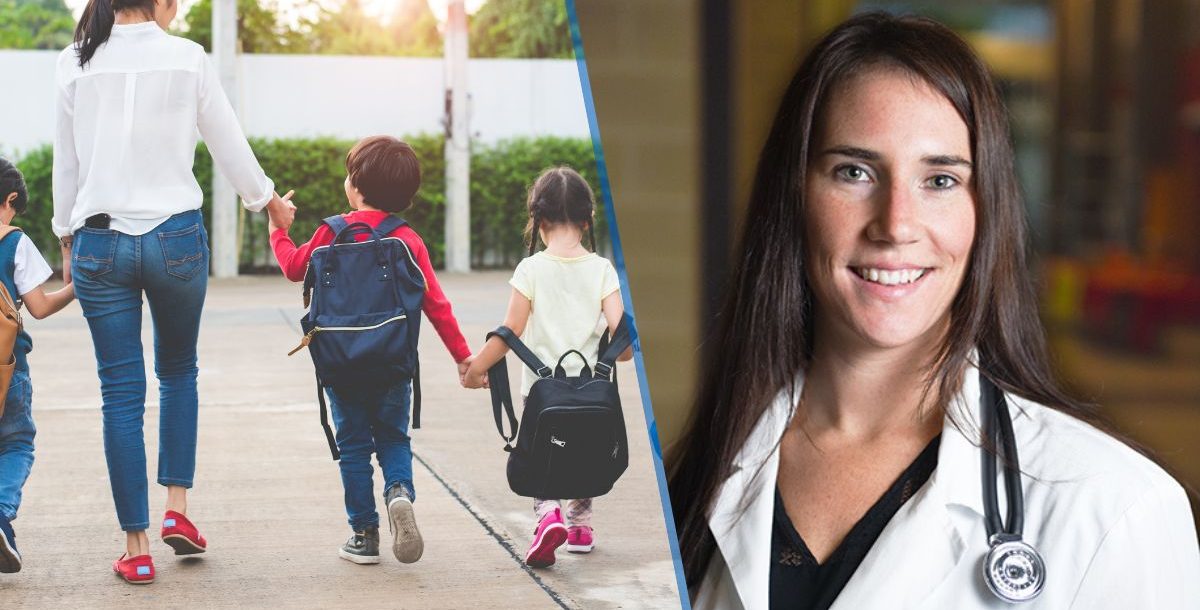To ensure the upcoming school year goes well, make sure your kid’s back-to-school health is in tip-top shape. Feeling healthy and strong always helps kids feel happier and more confident.
If your child is getting ready to go back to school, consider making an appointment with their primary care provider. Scheduling well checks before school begins each year can help ensure they return to school in good health.
Keep vaccines up to date
Vaccines are essential in preventing various diseases that can affect school-aged children, such as polio, measles and mumps. Your child’s health care provider can recommend the necessary vaccines based on their age, including options like the flu shot. Keeping vaccinations up to date is a critical aspect of back-to-school health.
Examples include vaccines for:
- Chickenpox
- COVID-19
- Flu
- HPV (human papillomavirus)
- Meningococcal disease
“Vaccines are important to prevent communicable diseases,” says Catherine M. Weathers, CNP, a nurse practitioner at Mercy Health – Maineville Primary Care. “These diseases can cause lifelong complications for children, which are preventable. The vaccines will allow children to be free of complications such as polio, measles and tetanus.
Have your child’s vision checked
Having your child’s vision checked is one of the most vital school health tips. Poor vision can negatively impact school performance and self-esteem. Approximately 5 percent of children struggle with vision issues, so it’s essential to ensure they can see clearly.
Check if your child’s school offers annual vision tests, and if not, arrange a test with a local health care provider. This is a simple step that can make a significant difference in your child’s academic success.
Schedule a well-child checkup
Late summer is the perfect time to schedule an annual checkup for your child, which is essential to monitoring vaccinations and checking vision. Your child’s health care provider will:
- Discuss any behavioral or emotional problems
- Conduct a physical exam
- Monitor growth and development
- Screen for hearing problems
- Track your child’s health history
This comprehensive checkup not only helps maintain a baseline for your child’s health but also identifies any issues early, ensuring they are ready for physical activity and other school demands.
Keep your child’s school informed
To help keep your child safe and healthy at school, ensure the school has up-to-date emergency contact information. Additionally, inform the school of any medical conditions or medications that may affect your child’s school day. Schools also need to know about any allergies, which could pose serious health risks.
Examples include allergies to:
- Bees
- Eggs
- Latex
- Milk
- Nuts
- Pollen
- Soy
- Wheat
By keeping the school informed, you can help create a safer and more supportive environment for your child.
Nurture your child’s creativity
Fostering your child’s creativity is another important aspect of back-to-school health. Let them choose their own masks and assist in preparing personal packs of hand sanitizer, tissues, glue and scissors. This involvement not only enhances their creativity but also reduces the spread of germs in the classroom.
“Encouraging children’s creativity allows them to learn how to problem solve. Creative play makes children process how things work as well as analyze how it works,” Catherine says. “When children are playing family, drawing, building with blocks and have free play, they learn how to resolve conflict and express how they are feeling. Creativity can improve a child’s emotional intelligence, while having constant stimuli from a device can hinder a child’s development with creative thinking and problem-solving.”
Allowing your child to pack their own school supplies, including a washable backpack, utensils, single-serve snacks and a personal water bottle, fosters responsibility and independence.
The responsibility for creating a safe school atmosphere this year will be the job of teachers, staff, parents and students. However, the payoff will be great.
More back-to-school health tips to try
If you’re wondering what else you can do to keep your kids healthy and happy, consider these back-to-school health and safety tips:
- Choose a rolling backpack if your child has lots of books.
- Provide healthy after-school snacks.
- Look for back-to-school healthy lunch ideas to pack for school.
- Make sure backpacks have adjustable straps, padding and plenty of pockets.
- Start the day with a nutritious breakfast.
- Avoid sugary drinks and limit time on electronic devices.
- Try to make sure kids get adequate sleep – at least eight hours each night.
How can you help your child adjust back to school?
To help your child adjust, establish a consistent bedtime routine, gradually reintroduce school year schedules and discuss any anxieties they may have. Encourage your child to have open communication about their feelings and support them by involving them in preparations.
How can you prepare kids to go back to school?
Prepare kids for school by ensuring they have all necessary school supplies, reviewing their class schedule and arranging for a calm and organized morning routine. Encouraging physical activity and limiting screen time before bed can also help them transition smoothly.
Can going back to school cause anxiety?
Yes, going back to school can cause anxiety for some children. This may stem from the fear of the unknown, changes in routine or social pressures. To help, maintain open communication, provide reassurance and consider discussing concerns with a health care professional if anxiety persists.
How we can help
By following these back-to-school health tips, you can ensure your child is well-prepared, both physically and mentally, for the new school year. A proactive approach to health and wellness will help them thrive in the classroom and beyond.
If you feel like your child is having any physical or emotional issues, regardless of the time of year, make an appointment with your child’s provider.
Learn about the family medicine and pediatric care services we offer at Mercy Health.






